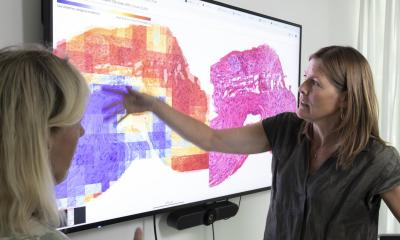
© N Felix/peopleimages.com – stock.adobe.com
News • LLM-based mental health detection
AI model could help prevent suicide in hospital patients
In the future, artificial intelligence (AI) could help to identify suicidal patients and inform medical staff early.
This is the result of a recent study by researchers from the Else Kröner Fresenius Center (EKFZ) for Digital Health at TUD Dresden University of Technology, together with doctors from the Clinic and Polyclinic for Psychiatry and Psychotherapy at the University Hospital Carl Gustav Carus Dresden, which was published in “The British Journal of Psychiatry”.
The authors used a new large language model (LLM) of the “Llama 2” family to analyze texts from psychiatric patient histories. The researchers wanted to know how well their model can identify suicidality in patients – for example, whether they had suicidal thoughts or the wish to die. To this end, they examined one hundred admission documents and showed that their model can reliably and accurately identify these cases. The researchers used local in-house hospital servers to ensure optimum protection for sensitive personal data and to maintain privacy.
Recommended article

Article • Artificial intelligence meets internal medicine
Medical AI: Enter ‘dea ex machina’
In the world of theatre, the ‘deus ex machina’, the god from the machine, is a dramaturgical trick to resolve seemingly unsolvable conflicts. Can artificial intelligence (AI) also be such a universal problem solver for internal medicine? At the Annual Congress of the German Society of Internal Medicine (DGIM), Dr Isabella Wiest explored the potential – and limitations – of AI helpers.
“We were able to show that suicidality in patients can be automatically extracted from electronic health records – with the help of large language models. Our results underline the great potential of LLMs for medicine. Although we used a model that was not specifically developed for analyzing psychiatric data, the results were reliable and accurate. And they can also be further improved by modifications. Possible clinical applications include early warning and monitoring systems for psychiatric emergencies, improved quality assurance and the analysis of psychiatric symptoms within large datasets,” says Falk Gerrik Verhees, one of the lead authors of the study and a psychiatrist at the University Hospital Carl Gustav Carus Dresden.
In the future, these AI methods could support medical professionals in their decisions and facilitate medical documentation
Isabella C. Wiest
The researchers point out that further research is required before these models can be successfully integrated into everyday clinical practice. With their publication, they show that locally used LLMs are capable of extracting clinical information from free text with high accuracy. The use of local solutions with low hardware requirements also lowers the hurdles for implementation in practice.
“In the future, these AI methods could support medical professionals in their decisions and facilitate medical documentation. This would not only directly improve the quality of healthcare, but also advance medical research in the long term,” says Dr. Isabella C. Wiest, one of the lead authors of the study, a doctor at the University Hospital Carl Gustav Carus Dresden and researcher at the EKFZ for Digital Health.
Source: Else Kröner Fresenius Center (EKFZ) for Digital Health
05.12.2024










